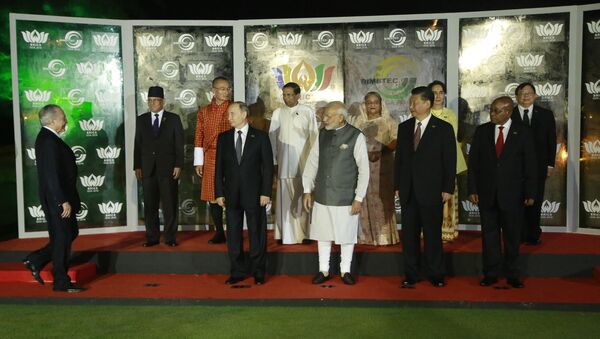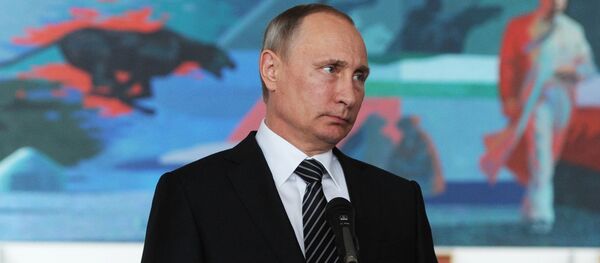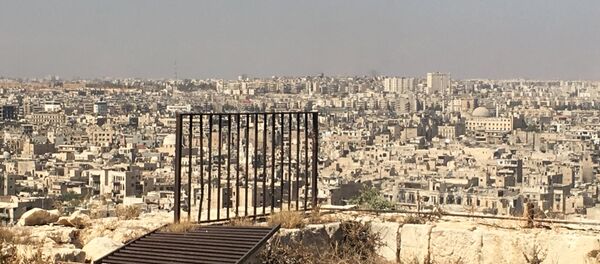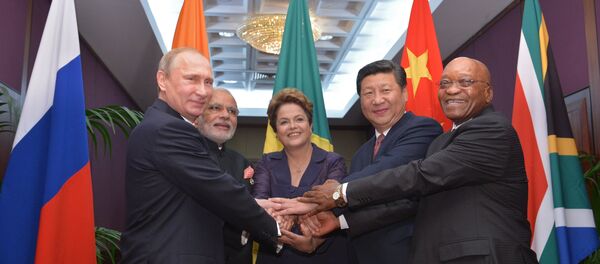Commenting on the significance of the summit, Svobodnaya Pressa columnist Sergei Aksenov noted that Moscow has invested a great deal of political capital in the event. "In the context of global tensions, the decisions taken by the BRICS countries may seriously affect the international situation," the journalist wrote.
President Putin confirmed as much in an interview for Sputnik and India's IANS news agency on the eve of the summit. Emphasizing that the BRICS group of countries "is one of the key elements of the emerging multipolar world," Putin pointed out that "our countries reject the policy of coercive pressure and infringement upon the sovereignty of other states."
"We take similar stances on urgent international issues, including the Syrian crisis and the Middle East settlement," Putin added. Noting that the BRICS powers have a "shared commitment" to observing fundamental principles of international law, including the central role of the United Nations, the president stressed that "with some Western countries attempting to promote their unilateral approaches, this position becomes even more relevant."
"In the past, these words might have sounded too formal and vague," Aksenov recalled. But now, at a time of acute crisis in Syria, they have gained a relevance like never before. With the rising giants of China and India signing on to the Russian position in Syria, "the conflict gains a truly global dimension – becomes a point on the map where the interests of the world's major powers intertwine," the journalist noted.
Apart from Syria, BRICS leaders discussed issues including the global economy, cooperation between BRICS members and other states, climate change and humanitarian issues. Several issues, including IMF voting quotas, the reform of the UN Security Council to give Brazil, India and South Africa a greater role in the body, and censure of the US-backed Trans-Pacific Partnership (TTP) and the Transatlantic Trade and Investment Partnership (TTIP), had the distinct appearance of a coordinated effort to challenge US-led efforts at global hegemony and unipolarity.
Still, Aksenov noted, from its inception and into the present, the BRICS "have been subjected to zealous criticism from the West." The Goa Summit was no exception, with "the global media publishing articles pointing to differences in the interests of the participating countries, and expressing skepticism about the feasibility of their cooperation."
"Indeed, at least two countries – Brazil and South Africa, are experiencing internal political difficulties," the journalist admitted. "Many experts associated the impeachment of Brazilian President Dilma Rousseff with US efforts. Nevertheless, from its inception, the BRICS was created with long-term goals in mind. Moreover, the pillars of the association are Russia, India and China." And these 'core' countries have not broken from their efforts to create a new, just world order.
"Today's BRICS have little to do with the group of countries originally discussed by those at Goldman Sachs who invented the term," Lukin noted. "Today, geopolitical factors, and their related economic factors, are central for the BRICS."
In fact, the analyst suggested, the BRICS have in some ways come to take up the role once played by the Soviet Union in offering a counterweight to the Western-dominated geopolitical and economic order; hence, for instance, their efforts to provide developing countries with a greater share in international financial institutions. Their main goal, Lukin stressed, is to become a powerful alternative to the G7 group of countries within the G20.
Speaking to Svobodyana Pressa, Boris Bolkhonsky, a senior fellow at the Russian Institute of Strategic Studies, noted that the evolution of the BRICS into an association of global significance will assist the development of bilateral relations between Russia and the world's other rising powers, particularly India and China.
"The common rejection of the unipolar world, which by all indications is presently coming to an end, will ensure our relations continue to develop favorably into the future," Bolhonsky said. "It's no secret that Russia, India and China are the three pillars of BRICS. Right now, we are witnessing attempts to undermine this format – for example, by events in Brazil. Furthermore, the US is trying to play off of conflicts between India and China, including territorial issues" (including China's cooperation with Pakistan in the disputed region of Kashmir).
Furthermore, India and Pakistan's formal entry into the Shanghai Cooperation Organization in the near future will hopefully help to defuse tensions, and further stimulate integration processes, Bolkhonsky explained. "Then a center of power will appear in Eurasia which will help strengthen the BRICS format."





